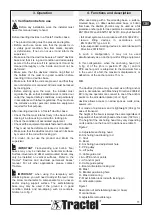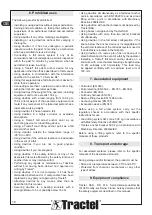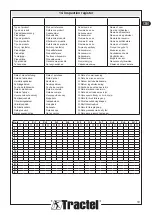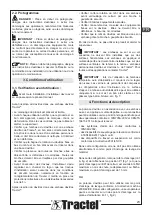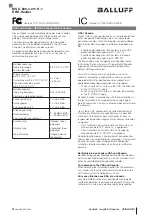
14
GB
operator as part of a rescue operation. Its use is very
safe. scafor™ R hoists are attached to the davitrac
mast at the rear using a bracket. scafor™ R may be
equipped with 20 to 70m cable.
scafor™ R is suitable for handling and securing loads
with max. SWL 500 kg
NOTE:
The scafor™ R hoist may not be used
alone to lower or raise an operator, other than when it
is used as a rescue lifting device (standard EN 1496).
If in doubt, please refer to the davitrac bracket manual.
5. Installation
NOTE:
when davitrac is on a self-stabilising
base, do not use the crane if there is any doubt about
the quality or type of ground.
NOTE:
when davitrac is on a base attached to
the structure, do not use the crane if there is any doubt
about the quality or type of bearing structure or base
fasteners.
5.1. Installing davitrac
The operator must first be protected from the risk of
falling before any installation work.
The davitrac crane may only be installed on Tractel
®
bases that are suitable for davitrac.
5.1.1. Setting up davitrac on its permanent bases
•
Install davitrac (M) (fig. 3.a) in a Tractel
®
base
•
Remove the boom articulation locking rod (L) (fig. 3.b)
and unlock the strut to unfold the davitrac boom
•
Unlock the boom transport locking system
•
Position the boom strut on the davitrac mast at its
intended location (fig. 3.c)
•
Lock the boom strut to the mast with the boom
articulation locking rod (L)
•
Insert the locking pin in the hole at the end of the
boom articulation rod (L)
NOTE:
Depending on the base, fit the mast
rotation locking rod (P) (fig. 3.c).
davitrac is now in place (fig. 3.c).
5.1.2. Installing the davitrac jib crane and the self-
stabilising base.
•
Install the self-stabilising base facing the working
area (fig. 6.a)
•
Adjust the width of the base using the rod adjustments
on the removable legs. To do so, remove the pin, and
then the rod, and select the position of use for each
leg. Put back the rods and pins (fig. 6.b)
The feet of the
self-stabilising mobile base must be positioned at least 20
cm from the edge of the hole. (fig. 6a).
• Adjust the four mechanisms so that the central base
assembly and the two legs are in a horizontal plane
(fig. 6.c)
•
Install davitrac (M) (fig. 3.a) in a Tractel
®
base
•
Remove the boom articulation locking rod (L) (fig. 3.b)
and unlock the strut to unfold the davitrac boom
•
Unlock the boom transport locking system
•
Position the boom strut on the davitrac mast at its
intended location (fig. 3.c)
•
Lock the boom strut to the mast with the boom
articulation locking rod (L)
•
Insert the locking pin in the hole at the end of the
boom articulation rod (L)
•
Fit the mast rotation locking rod (P, fig. 2) (fig. 3.c)
davitrac is now in place (fig. 3.c).
5.2. Dismantling davitrac
The operator must first be protected from the risk of
falling before any dismantling work.
To take davitrac off its base, remove the brackets and
systems installed on davitrac
NOTE:
Depending on the base, remove the
mast rotation locking rod (P) (fig. 3.c.).
•
Remove the locking pin from the hole at the end of the
boom articulation rod (L)
•
Remove the boom articulation locking rod (L) (fig. 3.b)
and unlock the strut to fold the davitrac boom
•
Lock the boom transport locking system onto the mast
•
Take davitrac off its base
davitrac is now folded up and ready for transport
(fig. 3.c).
5.3. Installing a bracket on the davitrac
mast
NOTE:
the davitrac mast may be equipped with
a variety of systems with a Tractel
®
davitrac bracket for
blocfor™ R - caRol™ - scafor™ R.
When only one system is installed, it must be installed
at the rear of the mast:
•
A scafor™ R or caRol™ hoist is placed in the high
position (fig. 4.a)
•
The blocfor™ R fall arrest device is in the low position
(fig. 4.b)
When several systems are installed, they must be
installed as follows:
•
A scafor™ R or caRol™ hoist is placed in the high
position at the rear of the mast (fig. 4.c)
•
The blocfor™ R fall arrest device is in the low position
at the front of the mast (fig. 4.c)











